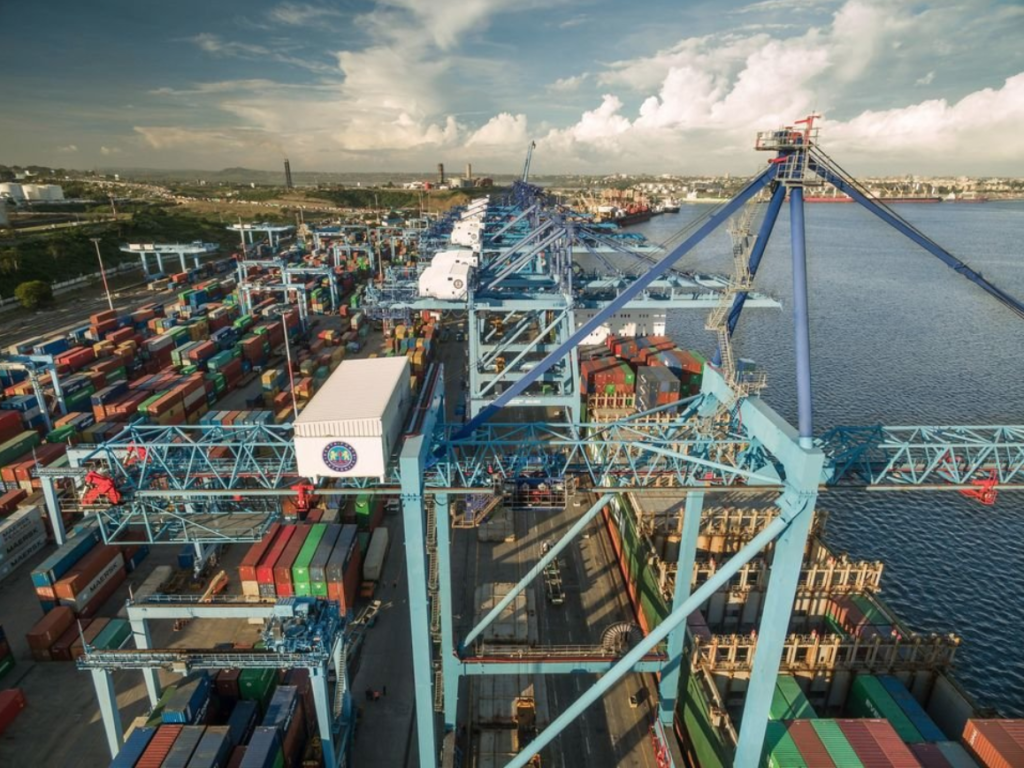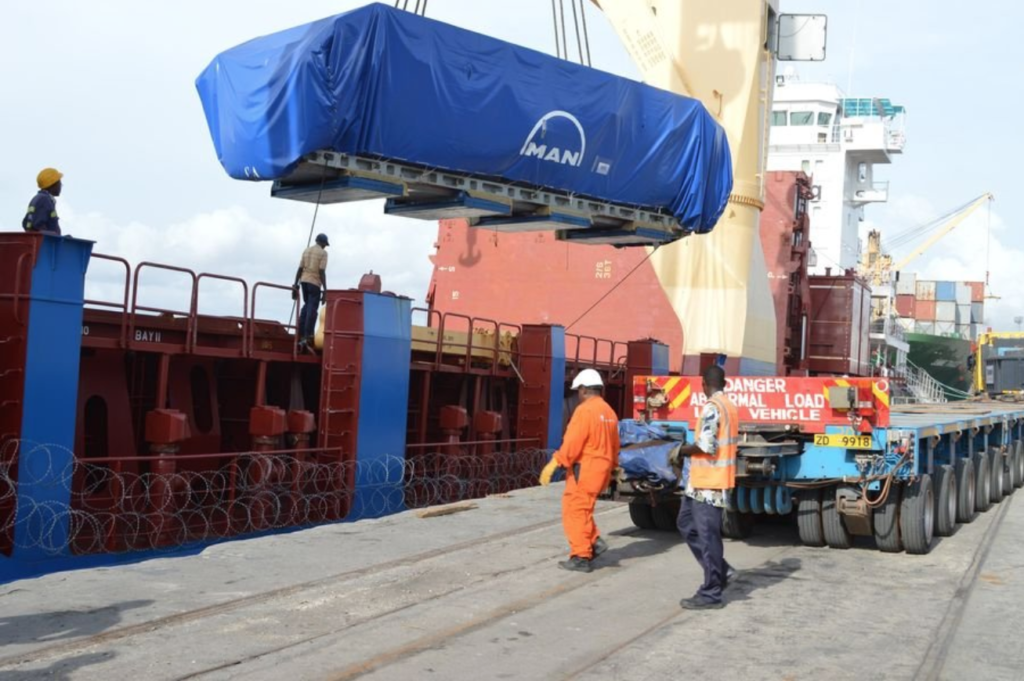By Danga Nyawatu
Billionaire businessman Jammy Roger Bebwawana, who was recently ranked among the top ten Fordes 600 richest men in Kenya, has opened up about how he built his logistics company, which started off as a public service vehicle business but, over the years, has grown into a formidable behemoth that transports goods from the port of Mombasa to as far as Kivu in the Democratic Republic of Congo and Rumbek in South Sudan.
“It has not been an easy journey,” Roger told the Nairobi Business Monthly in an exclusive interview at his Sh300 million residential property in Timau, just past Nanyuki town in Laikipia County.
Growing up, Roger and his boyhood friend, Barack Aligenya, used to scrounge in garages in Nanyuki town looking for axle bearings which they then used to make improvised wheelbarrows for ferrying the water they sold to homes that had no piped water.
“Many were the days when Barack and I would miss school so that we could sell water,” he reminisced, his gaze resting on the blue-black peaks of Mt Kenya, which, in the early morning sun glistened here and there, thanks to the thawing of snow on large parts of the mystery mountain that casts a shadow on the palatial home where Mr Roger has lived with his wife of 40 years, Mrs Laiya Bebwawana, originally from Samburu County.
One day, according to Roger, he and his friend found a discarded tyre that was in relatively good condition as he was rolling down a hill, heading towards the Liki River, where a man they simply called Mutiso used to buy old tyres for refurbishing and reselling to taxi drivers operating on a shoestring budget.
“Before I could get to Mutiso’s shed, I saw people standing around a matatu. I did not know what was happening, but when Barack and I got there, we found that one of the rear tires had blown out.
“Young man,” the driver said to me as the conductor worked feverishly to remove the destroyed wheel. “May I see your tyre.”
After looking it over, the driver realised that the tyre was the same size as the one that had blown out and in relatively good condition, and asked Roger to sell it to him.
“Muuzie (sell it to him),” Barack said, nudging me with his elbow. “So we negotiated a fair price and I sold the tyre to the driver. His conductor took it to Mutiso, who added the tube and fixed them to the rim and inflated it. They rushed back to the matatu, fixed the tyre and were ready to be on their way again. As for us, we headed to the nearest kiosk and I bought mandazi and soda for my friend and I.”
Unknown to Roger then, that would mark the beginning of his transport company.
In fact, the matter would have ended there, but not long after the incident, there was a big wedding at the Catholic Church right on the edge of Nanyuki town. The groom’s party arrived at the venue in several colourful buses with the word ‘Mbukinya’ emblazoned on the sides.
“Those days, it was common for boys to gate-crash at weddings so we could get free food and sodas. But what I remember about that day was Barack telling me; ‘Jairo — he always called me Jairo — do you know that the word ‘Mbukinya the short form for Mbuthia Kinyanjui?’”
“I was intrigued. How could someone name buses after himself in such a clever way?” Roger wondered, and started toying with the idea of doing the same.
The idea never stopped nagging him even after the wedding, and he kept ruminating about it for days on end.
One day, while they were returning from a nearby Total petrol station, where they had gone to get petrol, which they used to sniff by pouring it on old rags, an idea hit Roger’s head.
“What if we buy our own bus and call it ‘Jaba’?” he posed.
“What do you mean?” Barack asked, confused.
“We combine my name, Jammy Roger, and yours, Barack, and we start a transport business together,” Jammy Roger said, already excited. “We can make money taking people to weddings and funerals all over the country.”
“But we have no money,” Barack told him.
“We do,” Jammy Roger said. “I still have some money left from the tyre we sold to the matatu driver, remember?”
At the time, it sounded like a distant dream, and Barack thought that the petrol they were sniffing — which they used to call Geydey — was affecting Roger’s thinking.
Petrol fumes are known to cause hallucinations.
The two boys, aged barely 14 at the time, looked for an old Cow Boy cooking fat tin and used the balance from the tyre sale as the seed capital for their business dream. And every time they sold water, they would add the savings.
Then one day, Barack suggested to Roger that they could make money selling makeshift wheelbarrows to boys or their parents so that they too could fetch water and reduce the friends’ need to always be shuttling between the river and the various homes that needed water. And so, they started making the wheelbarrows, which they sold for about Sh400 each.
“That was in 1994,” Roger said. “Within one year, we had enough money to lease our first matatu, which we christened Jaba Transporters. We would pay the owner Sh500 a day and keep the balance. And because we were operating from Timau, many people thought we were transporting ‘Miraa’, which is also called Jaba. So they started asking us to ferry ‘Miraa’ for them.
Never ones to say no, the teenagers approached one of their neighbours, who operated a Sienta, and asked to lease it from him.
“Luckily for us, he agreed,” Roger recalled with a smile. “We removed the back seats and converted the car into a ‘Miraa’ carrier, transporting the narcotic from Maua to Nairobi.”
Because they were too young to drive, they would hire a driver and took turns to accompany him on the trips they made.
“On our way back, we would pick up supplies from River Road for the supermarkets in Timau and beyond,” Roger reminisced.
Soon the money started rolling in and they started buying their vehicles.
“My first car was a Chevrolet pick-up truck,” Roger said, pausing dramatically to sip from the mug of tea that was steaming on a stool beside him. “It was one of the best investments I have ever made because I sweated that asset till it could sweat no more.”
It is often said that success breeds success, and the two friends benefitted from this age-old aphorism.
“A man called Kamau approached us once and asked if we had trucks to transport fuel. That day, the cargo train that plies between Nairobi and Nanyuki had broken down and there was an artificial shortage of petrol, diesel and keresone all the way from Nanyuki to Makutano in Meru.”
Of course, the two teenagers said they had trucks, though they had none.
“It so happened that one day, while having tea at Sportsman Arms, we had overheard another man talking about his trucks. We set out to look for him. Sure enough, we found him and as luck would have it, he did not have an engagement for his trucks at the time.”
Acting like brokers, they negotiated a price with the two men, ensuring they had a handsome margin, and for the next few weeks, the trucks shuttled between Nairobi and Meru transporting the fuel and ensuring there was no shortage.
 “We would have gone on like this for a while longer, but the two men met without our knowledge and that is how, with one blow, they cut us off the gravy train.”
“We would have gone on like this for a while longer, but the two men met without our knowledge and that is how, with one blow, they cut us off the gravy train.”
That was the first major hurdle that the two friends.
“The next one was when Barack died in a helicopter crash. We had made so much money that we could afford to hire any plane at the Nanyuki airstrip. Barack, being a daredevil, hired this helicopter and, when they were midair, he asked the pilot if he could try flying it. I think they were drunk. The next thing we heard was that they had crashed in Mukogodo and the two of them died.”
Once the mourning period was over, Roger approached Barack’s widow with an offer to buy his friend’s shares. After some negotiations, the widow agreed and the two consummated the deal, making him the sole director of the company.
“That was when I changed the company name from Jaba Transporter to Jaba Logistics,” he said.
But, the NBM team sought to know what informed the choice of the company’s name.
“My son had come from abroad, where he had been studying Business Development. And he told me that if I changed the company name and logo, the business would grow. So I told him to go ahead.”
That was when the company’s fortunes improved dramatically and started attracting international clients.
“Our problems started with Barack’s widow learned how successful the company had become,” Roger said, his face darkening for a fleeting moment. “She went to court to demand that she gets her husband’s shares back for the same amount we had paid her. The case is ongoing, but we have an upper hand because we had the foresight to change the company’s name. So she cannot get what she has been demanding because it is no longer there.”
Asked about his new ranking by Fordes 600 as one of the richest men in Kenya, Roger was modest.
“Hiyo ni mambo ya Mungu (that is God’s favour),” he said.
And what does he think about Kenya’s taxation regime.
“That, my friend, is a live wire. I am in business. The less I say about that, the better. But I pay my taxes the way a patient swallows bitter medicine.”
Editor’s note: This story was published on April 1, 2024, for entertainment purposes and contains only one historical fact.


